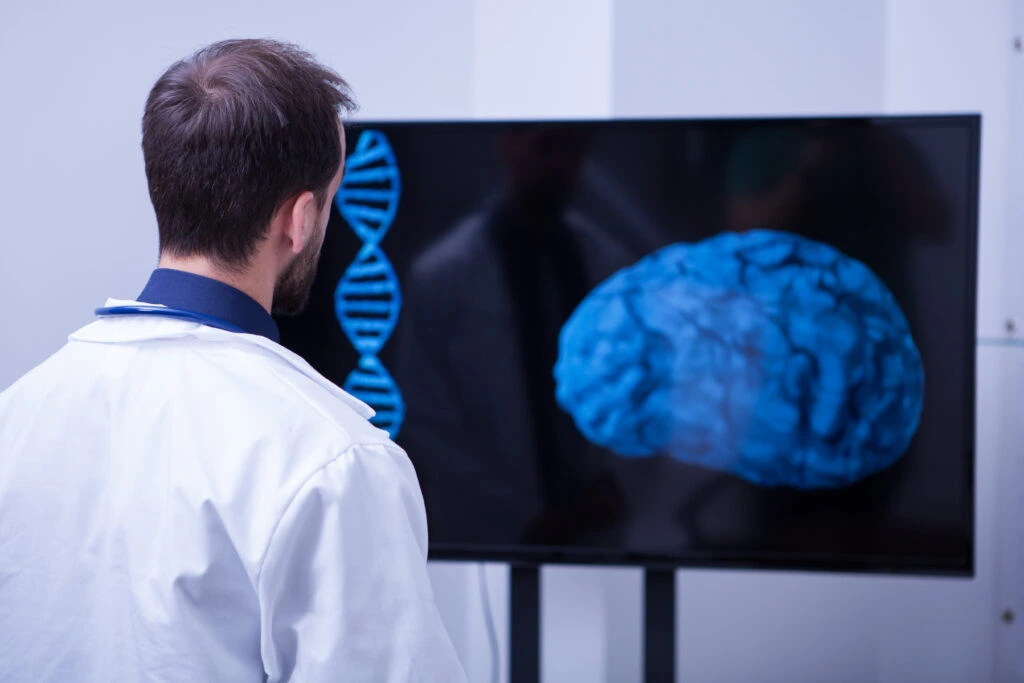What Are Non-epileptic Seizures?
Non-epileptic seizures (NES) are episodes that look like epileptic seizures but are not caused by sudden electrical discharges in the brain. Instead, they seem to be caused by psychological factors like stress or trauma. NES are also known as psychogenic non-epileptic seizures (PNES).
The symptoms of NES often resemble epileptic seizures, including convulsions, loss of consciousness, and confusion. However, there are some differences that can help distinguish between the two. For example, during an NES, there is no change in brainwave activity based on the EEG.
During an epileptic seizure, there is typically a characteristic pattern of the sudden surge in the brain’s transmission of electrical signals. Also, these seizures cannot be treated with anti-epileptic medications as they don’t affect the underlying cause.
What Do Non-epileptic Seizures Look Like?
Non-epileptic seizures can manifest in various ways and may sometimes look like an epileptic disorder. The person may experience different symptoms that are not epileptic seizures, but still, the individual cannot control them.
Different factors can contribute to developing Non-epileptic seizures, including:
- Psychological trauma
- Acute and severe stress
- Medical conditions like low blood sugar or heart disease
Here are some examples of non-epileptic seizures and their characteristics:
- Psychogenic non-epileptic seizures (PNES): These are seizures that are caused by psychological factors such as anxiety, depression, or trauma. PNES may look like epileptic seizures, but there are some differences. For example, PNES may be more prolonged, may not involve rhythmic movements, and may not respond to medication used to treat epilepsy.
- Syncope: Syncope is a fainting episode that can be caused by a sudden drop in blood pressure, dehydration, or heart-related problems. During syncope, a person may lose consciousness, fall to the ground, and experience muscle twitching or convulsions.
- Neurological conditions involving motility: Movement conditions such as dystonia, chorea, or myoclonus can cause sudden, involuntary movements that may resemble seizures. However, these movements are usually more limited in scope and do not involve loss of consciousness.
- Migraine headaches: Some people with migraines may experience a type of seizure called a “migraine with aura.” During this type of seizure, people may see flashing lights, experience tingling or numbness in their limbs, or have difficulty speaking.
It is essential to consult your GP if you believe you or someone you know is having a seizure. Early assessment and proper care approach are crucial for any health challenge.

Types of Non-epileptic Seizures
There are several types of non-epileptic seizures (NES) that can be caused by an organic (physical) or a psychological factor. The following lines reveal the common types of non-epileptic seizures and the underlying symptoms.
Dissociative Seizures
Dissociative seizures explain a specific state of dissociation during the non-epileptic seizure. In the course of a dissociative seizure, a person may experience several epilepsy-like symptoms, including loss of awareness, uncontrolled movements, or not responding to questions and commands.
The main reason behind this state of mind is severe trauma, intense fear or a life-changing event that left a significant impact on people’s mental health. It’s important to highlight that a person with dissociative seizures does not fake or malinger the symptoms, as the person seems “disconnected” from the outer world in the moment of seizure.
Common symptoms of dissociative seizures include:
- Loss of consciousness or altered awareness: During a seizure, a person may experience a loss of consciousness or have an altered awareness of their surroundings.
- Convulsions or jerking movements: Some people may have convulsions or jerking movements like epileptic seizures.
- Muscle stiffness or paralysis: Some people may experience muscle stiffness or paralysis during a seizure.
- Sensory changes: During a seizure, a person may experience changes in their vision, hearing, or other senses.
- Breath holding: Some people may hold their breath during a seizure, leading to temporary oxygen deprivation.
- Unusual movements: Some people may exhibit unusual movements during a seizure, such as thrashing or flailing their limbs.
Non-epileptic Seizures with Organic Cause
NES with organic or physical causes may be triggered by various health conditions, including heart problems, metabolic conditions like diabetes, low blood pressure, or alcohol and substance misuse.
Non-epileptic seizures with an organic cause can be easy to identify and treat. For example, losing consciousness or fainting can be caused by specific heart conditions. In this case, treating the cause will prevent seizures from happening.
Non-epileptic Seizures with Psychological Causes
Relating to dissociative seizures, other types of non-epileptic seizures can also have psychological causes, including:
- Panic attacks in extremely frightening or stressful situations, with recurring memories of frightening situations or a future event causing the person extreme fear and anxiety.
- Factitious seizures, such as in Munchausen’s syndrome, where the person may be purposely causing the seizure. These are rare forms of a seizure, and the person tends to seek medical attention, observation and treatment.

Non epileptic Seizures Symptoms
The symptoms of non-epileptic seizures can vary from person to person, but in most cases, they look very close to an epileptic seizure. However, these seizures are a result of emotional stress.
NES may mimic the symptoms of generalized convulsions, like tonic-clonic seizures, followed by shaking and spasms. In other cases, people may experience an episode similar to absence seizures ( a short lapse in consciousness) or fainting seizures (syncope).
Common symptoms of non-epileptic seizures (PNES) include:
- Jerking or twitching movements
- Convulsions
- Making uncontrolled sounds and noises like crying or shouting
- Numbness and stiffening in the body
- Falling down if standing
- Loss of awareness
- Loss of bladder control
- Feeling confused after regaining consciousness
- Biting the tongue
- Strange smell and taste
- Staring and confusion
- Repetitive and rhythmical movements
Not all seizures are caused by epilepsy, and a comprehensive evaluation by a neurologist or epileptologist is necessary to diagnose and treat non-epileptic seizures properly. Additionally, non-epileptic seizures may be caused by psychological factors, and psychotherapy and other forms of psychological support may be necessary for treatment.
Non-epileptic Seizures in Children
Psychogenic non-epileptic seizures (PNES) can occur in children, although they are less common than in adults. PNES in children can be caused by various factors, including anxiety, depression, post-traumatic stress disorder (PTSD), or other psychological or emotional stressors.
The symptoms of PNES in children are like those seen in adults, including:
- loss of consciousness or altered awareness,
- convulsions or jerking movements,
- muscle stiffness or paralysis
- sensory changes
- breath holding
- unusual movements.
Diagnosing PNES in children can be challenging, as their symptoms may be difficult to distinguish from those of epileptic seizures. A comprehensive evaluation by a paediatric neurologist, epileptologist, and mental health professional is often necessary to properly diagnose and treat PNES in children.
Treatment for PNES in children typically involves a combination of psychological therapies, such as cognitive-behavioural therapy or play therapy, as well as stress reduction techniques and medication, if necessary. Treatment aims to help the child better manage stress and emotions and decrease the frequency and severity of seizures.
What Causes Non-epileptic Seizures?
We all react differently to emotional changes and life challenges. All positive or negative experiences can leave a profound and long-lasting impact on our physical and mental health, and every person has a unique way of coping with them.
In most cases, non-epileptic seizures are caused by the following factors:
- Life-changing accidents
- Unhealthy relationships
- Being bullied
- Stress and trauma like separation or death of a loved one
Can Lack of Sleep Cause Non-Epileptic Seizures?
Yes, lack of sleep can potentially trigger non-epileptic seizures (NES), also known as psychogenic non-epileptic seizures (PNES). These seizures are not caused by electrical disruptions in the brain, as with epilepsy, but can be influenced by psychological and physiological factors, including stress and exhaustion. Sleep deprivation can exacerbate stress, impact emotional regulation, and lead to fatigue, all of which may contribute to the onset of NES. Individuals who experience significant sleep deficits might find that their seizure frequency increases when they are overly tired, highlighting the importance of adequate sleep and self-care for those prone to these types of seizures.

What Triggers Non-Epileptic Seizures?
Sometimes, it can be challenging to identify the specific trigger that causes such an intense reaction in a person’s body and mind. For some people, the NES occur shortly after the specific trigger. In other cases, the NES can occur years later or for no apparent reason. It is not uncommon that the fear of having a seizure causes the seizure to happen.
Non-epileptic seizures while sleeping
During sleep, NES may be characterized by sudden movements or jerks, abnormal breathing patterns, and heart rate or blood pressure changes. Other symptoms may include sweating, shaking, and convulsions. NES can also cause disruptions to sleep, leading to fatigue and daytime sleepiness.
If you believe that you may be having a NES during sleep, speaking with your healthcare provider is essential. They may recommend an electroencephalogram (EEG) to rule out epilepsy and other neurological conditions. In some cases, psychological therapy may also be recommended to address any underlying emotional or psychological issues contributing to NES. Treatment options may also include medication, lifestyle changes, and other interventions as appropriate.
Non Epileptic Seizures and Driving
Driving licenses in the UK are regulated by Driver and Vehicle Licensing Agency. It is likely that you will have to pause driving and inform DVLA that you have been diagnosed with PNES. You can apply for a new driving licence when you spend three months without a seizure.
If there is a risk of having a NES while driving, you will probably need additional specialist review.
Seizure Care and Support with Unique Community Services
At Unique Community Services, our mission is caring for and supporting people with additional needs. Our team derives kindness and dedication in every care package we offer.
Unique Community Services provides person-centred home care tailored to your specific health needs and personal boundaries. Our practitioners support people with epilepsy and non-epileptic seizures, mental health needs, and physical disabilities in their own homes.
We provide support services for people with chronic and enduring clinical support needs across South England. Contact us now, and we will create an individual care plan tailored to your specific needs and preferences.
